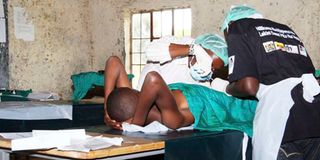Developing story: Iranian President Ebrahim Raisi confirmed dead in chopper crash
Boys’ circumcision: Gusii elders, leaders looking to revive the fading Abagusii culture

Nurses carry out voluntary medical male circumcision procedure on a boy. Abagusii elders say the abandonment of aspects of culture such as communal circumcision is partly to blame for erosion of morals.
A few years ago, boy circumcision was a big deal in the Gusii region.
Early teenage boys would face the circumciser to graduate to young adulthood.
In the 1980s and earlier, the ceremony was ritualistic in nature. It was performed traditionally, with a knife and without anaesthetic.
People who accompanied the boys during the ceremony sang ritual songs on their way back. When they arrived home, the gates were opened for everyone in the community to enter and feast.
A special person was appointed to guide and mentor an initiate, to know the do's and don'ts of adulthood, for he had graduated from boy to man.
All this gradually changed due to various factors, including urbanisation and the arrival of diseases such as HIV/Aids.
The elders of the Gusii community now say that the abandonment of this aspect of the culture is partly to blame for the erosion of morals and other social challenges facing the residents.
They are now making efforts to revive the fading culture, while adhering to all necessary health protocols.
The elders are now promoting the communal circumcision of boys as a way of uniting members of the community and reminding them of Gusii way of life.
In particular, community leaders have started an initiative to mobilise resources and hold community circumcision events for hundreds of local boys.
More than 1,000 boys underwent a modern rite of passage mixed with traditional culture at two separate events held in the region over the past two weeks.
On Wednesday, 500 boys from Masige East and West wards graduated into young adults in a ceremony attended by some of Kisii's leaders.
Masige East MCA Jacob Bagaka and his Masige West counterpart Michael Motume were the masterminds behind the ceremonies.
A week earlier, a similar number of people had denounced boyhood in Ibeno ward, a ceremony organised by area MCA Steve Arika.
Obino Nyambane, an elder and Kisii County Director of Culture, said the importance of such ceremonies was that they formed a generation, locally known as Ekiare or Abagisangio.
"People who have been circumcised together form a generation or abagisangio. Abagisangio speaks of those who share and sharing brings unity within homesteads and clans," Obino said.
The elder added that such unity can be transformed into social and political power.
He said that in the recent past, most families have held initiation ceremonies for their boys in silence, which has undermined community unity.
"The reason why we witness endless socio-political struggles in our community is because we lack unity from the very beginning. The only way to foster this unity is to teach our children the importance of coming together," said Mr Obino.
Efforts are already underway to document and digitise the Abagusii culture in a move by the national government to preserve Kenya's traditions.
Officials from the State Department of Culture and Heritage and other stakeholders were recently in Kisii to document the Abagusii culture.
Evans Taraja, head of research at the National Museums of Kenya, said Kisii was one of the counties selected to undertake the "documentation and digitisation of indigenous knowledge and associated assets". Mr Taraja said Kisii was in the first phase of the project, which involves 13 counties. The second phase will involve 20 counties, while the third phase will involve 14 counties.
Other counties in the first phase include Garissa, Makueni, Kilifi, Tharaka Nithi, Marsabit, Murang'a, Turkana, Kakamega, Siaya, Vihiga, Kericho and Narok. The project is funded by the Sh200 million Sports, Arts and Social Development Fund under the Ministry of Youth Affairs, Sports and Arts.
"We have 30 young cultural champions, community elders and some representatives from the county culture department who will be trained on how to implement the project," said Mr Taraja.
He added that the group will work closely with ICT experts who will work around the clock to document and digitise the community's culture.
Mr Taraja noted that the county and national governments will sign a 'Prior Informed Consent Agreement' to ratify the project.
He said during the 30-day stay in Kisii, the young cultural champions, assisted by community elders, will move around the county documenting the culture.
"They will come up with a digital register of Kisii County that will preserve the traditions," Mr Taraja said, adding that the Kisii County government has ensured the sustainability of the project by including it in the County Integrated Development Plan (CIDP).
He said that as national government officials, they were happy with the step taken by the county government to ensure that the project has a bright future.





